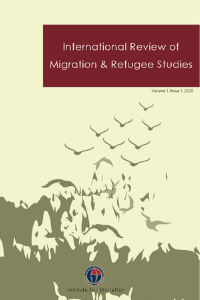Abstract
References
- Referans1 Saybaşılı, N. (2011). Borders and Ghosts: Migration in Visual Culture. Metis Publications.
- Referans2 Derrida, Jacques. (1994). Spectres de Marx. English: Specters of Marx: the state of the debt, the work of mourning, and the New international.
The media visibility of migrants under the shadow of hauntology “a manifest issue and an unseen catalyst"
Abstract
This essay will aim to elucidate the concept of hauntology, which has hitherto not had extensive coverage in Turkish poetics. The inclusion of hate speech in media depictions of migrants is not only unsettling due to scholarly concerns but also a source of unhappiness for myself as a human being and a woman, and for many others who think the same way. This article aims to provide a brief definition of hauntology, for which, according to Nermin Saybaşılı ’s meticulously written book in which she blends the concept of migration with visual culture, we are indebted to Jacques Derrida .
Scholarly restrictions and boundaries can often become limiting when it comes to talking about social issues. However, this does not have to mean giving up on a foundation of science and justness. I feel compelled to make this statement purely because of the respect I award the reader and myself. The language this article uses is closer to daily speech than to academic jargon, which is why I have overstepped the boundaries to use an “I” language. This felt more appropriate perhaps due to my desire to connect to the concept of migration on a deeper level.
Moving on to the realities of the region in which we live and the country where I am a citizen. The Turkish word for hauntology, musallatbilim [musallat: nuisance, bilim: science], first prompted me to compile a well-rounded definition of the word musallat. I consulted trustworthy sources to get to the bottom of this word.
The word musallat is derived from Arabic. It means “a person who obsessively focuses on a thing or another person.” According to Nişanyan’s Etymological Dictionary, the word can also mean “sovereign,” or, “that which claims sovereignty.” It appears in Turkish for the first time in the Qutadgu Bilig (1069). The negative connotation of the word does not come into play until the 19th century. The most often used phrasal verb derived from this word is musallat etmek, meaning “to plague, to torment,” as exemplified in these two sentences taken from the Turkish Language Institution (TDK) and the Language Foundation:
“The handful of scenes he quotes from the play consist of the reflections that torment us, created by our memory.”
Selim İleri
“Thanks to our headmaster who didn’t want us to go without a teacher, our classroom was plagued by the other geography teacher.”
Rıfat Ilgaz
Another widely used phrasal verb is musallat olmak, meaning “to bother someone constantly, to pester someone unrelentingly.” Again, I have provided two example sentences, one taken from the Turkish Language Institution (TDK) and the other from the Language Foundation:
“The anxiety which had been bothering him since last night had taken root in his heart again.”
Necati Cumalı
“If he were to pester me too, I simply had to ignore him.”
Reşat Nuri Güntekin
At this point, the meaning of the word musallat compelled me to further question the concept of migration. Are migrants really individuals that plague others? In other words, have they been sent by other people to torment us? Using the secondary meaning of the word, is the state of migration/being a migrant, a nuisance for the Anatolian/Central Asian region we live in?
Let’s try another approach. Could the “state of sovereignty” alluded to by the earlier use of the word compel us to look at the situation from another perspective? Perhaps the “migrant” arrives at his destination to claim sovereignty and to say, “wake up from your slumber, for I have arrived.”
Saybaşılı talks about how Derrida questions the scholar. If you allow me to, I choose to push this towards the margins, and to raise these questions.
I think that the unreliability of data concerning migration, the unclear futures of the displaced, and the state of forgetting that the mass of people affected by this situation consist of human beings could not be wholly explained neither by the hate speech employed by the media, nor by Derrida’s hauntology.
Should we/could we instead engage in a wholesale questioning of our humanity?
Saybaşılı, N. (2011). Borders and Ghosts: Migration in Visual Culture. Metis Publications. p.19
Derrida, Jacques. (1994). Spectres de Marx. English: Specters of Marx: the state of the debt, the work of mourning, and the New international
https://www.nisanyansozluk.com/?k=musallat (Accessed: 2 February 2020)
https://sozluk.gov.tr/ (Accessed: 2 February 2020)
http://www.dildernegi.org.tr/TR,274/turkce-sozluk-ara-bul.html (Accessed: 2 February 2020)
Keywords
References
- Referans1 Saybaşılı, N. (2011). Borders and Ghosts: Migration in Visual Culture. Metis Publications.
- Referans2 Derrida, Jacques. (1994). Spectres de Marx. English: Specters of Marx: the state of the debt, the work of mourning, and the New international.
Details
| Primary Language | English |
|---|---|
| Journal Section | Articles |
| Authors | |
| Publication Date | October 9, 2020 |
| Published in Issue | Year 2020 Volume: 1 Issue: 1 |


